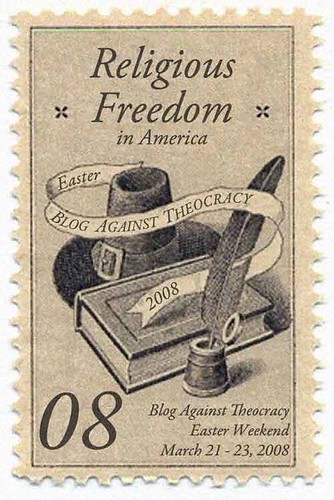In lieu of Easter, I would like to invite you to join me in celebrating Blog Against Theocracy Weekend!
 With all of the talk about religion in the current presidential race in the United States,
With all of the talk about religion in the current presidential race in the United States,
I’d like to say that I do not think religion belongs in the public debate or the public sphere at all. Just like our sexual activities, our religious activities should be private. I find it embarrassing that these things are brought into the discussion about political candidates. In the election process, we are essentially interviewing someone for a job. If I were hiring someone at the company where I work and I asked them about their sex life or their religious views, I would be fired. And rightly so. Hiring a marketing manager or a computer programmer is no different — should be no different — than hiring a president. We should be looking for the person with the best understanding of the job requirements, and the best qualifications for the job, including education and experience. Period. That’s it.
Unfortunately, most Americans seem to think that the candidates’ sexual lives, and perhaps even more importantly, their religious beliefs should be part of the national dialog. Since this is the case, I think we should grill the candidates as much as religious followers do. With that in mind, I’d like to point out this post at First Freedom First, “Questions to ask the Candidates.”Here are my favorite three questions from the list, although it was hard to pick just three:
Do you think my pharmacist should be allowed to deny me doctor-prescribed medications based on his or her religious beliefs?
Will you respect the rights of those in our diverse communities of faith who deem same-gender marriage to be consistent with their religious creed?
Should “faith-based†charities that receive public funds be allowed to discriminate against employees or applicants based on religious beliefs?
Even some believers want to ask the candidates more pressing questions, not content for them to simply wave the flag of faith. If candidates are claiming religious piety in order to garner the votes of the faithful, they should have to validate their claims and show how their faith would inform their policies. Here are some questions that Randall Balmer, evangelical Christian an author of the book God in the White House: A History: How Faith Shaped the Presidency from John F. Kennedy to George W. Bush thinks Bush should have had to answer:
Mr. Bush, Jesus demands in the Sermon on the Mount that his followers ‘turn the other cheek’? How will that teaching guide your conduct of American foreign policy, especially in the event of, say, an attack on the United States?
Jesus, your favorite philosopher, says that we should care for ‘the least of these.’ How does that inform your understanding of welfare or Social Security or civil rights or the graduated income tax?
Mr. President, Jesus expressed concern for the well-being of the tiniest sparrow. Do you see any relationship between that sentiment and your administration’s environmental policies?
Mr. President, Jesus, the man you invoked on the campaign trail as your favorite philosopher, invited his followers to love their enemies. How does that teaching square with the invasion of Iraq or with your administration’s policies on torture?
Balmer is a supporter of separation of church and state, although he does not believe, as I do, that religion has no place in the election process. He does, however, believe — as did most of the churches I attended as a child — that the combination of religion and politics is dangerous and a recipe for disaster:
Nearly four centuries ago, Roger Williams recognized the dangers to the faith of too close an association with the state. He worried that the “garden of the church” would be sullied by the “wilderness of the world” if not for a “wall of separation” between the two. Neither Williams nor the founders proposed to bracket an individual’s faith from political considerations, but they discerned the dangers of conflating the two.
I agree with Balmer that if we are going to have this discussion, we need to make the candidates answer serious questions about the policies they intend to enact and their beliefs about the Constitution and the freedoms and rights of American citizens. If their religious beliefs will cause them to fail to preserve, protect, and defend the Constitution — the only thing they swear to do upon inauguration — then they do not deserve our votes.





Another thought for the weekend:- I have known for a while that the end of Ramadan is marked by the visibility of a new moon, as seen from Mecca, what I hadn’t realised up until now, though, is that the date of Easter is dependent on the Full Moon. How very pagan. http://www.space.com/spacewatch/080321-ns-paschal-moon.html
One cannot simply make a comparison (sex-religion) and expect everyone to buy it like iPods.
Clearly religion has to remain an issue in American elections for the foreseeable future, since too many of you (I just happen not to be one) consider it an issue – any candidate trying to avoid or sidestep the issue, or, God forbid, declare himself an atheist, might as well make it his concession speech.
But I’m not sure why the religious issue should be treated differently from other issues – you’re (American voters) electing a policy maker, and policies s/he might make about religion might very well affect your life (e.g. veils, holidays, fund usage).
As for the employment analogy – it wouldn’t be fair to fire one of two workers with similar performance over the other because you happen to learn (later, after their skill and loyalty has been tested) that one of them is an/a , but it (or another trait someone might consider private) might be pertinent to your decision while hiring them – what else have you got to go one?
“best understanding of the job requirements”, as you say, can be defined to include understanding of reality. A matter of taste, perhaps, but a criterion for some people.
(btw, ammonyte – are you really expressing general surprise at the fact that modern paganism shares some elements with slightly dated paganism?)
“One cannot simply make a comparison (sex-religion) and expect everyone to buy it like iPods.”
Oh, I dunno. C.S. Lewis used to argue from analogy an awful lot in his apologetic works.
Afterthought – How aggressively are democratic candidates grilled about their religious beliefs? Is it wishful thinking to hope that some of them might be atheists or that the media is letting this issue slide because they’re sensible?
I don’t have much to go on beyond the Daily Show, but I think I could answer my own question “no”…
PS – Curse my preview-shunning ways… I didn’t know angle brackets can’t be displayed. In the comment above, the sentence “that one of them is an/a” should have been “that one of them should be <silly belief system>” :-(
I’m not comparing sex and religion. These are merely two examples of issues that are not related to job performance. There are many others:
What kind of music you enjoy
Whether you prefer cats or dogs
If you are a vegetarian or a meat eater
If you take showers or baths
If you cut your hair or wear it long
If you read more fiction or nonfiction
What color you are
Whether you have a penis or a vagina
The list is virtually endless.
I chose sex and religion as my examples because these are two issues that are being shoved into the public sphere by religious zealots and media pundits.
My issue – people who say they *know* that god/jesus/name-your-deity exists have poor logic. It’s one thing to say you have faith, it’s another to say you have knowledge.
Anyone on this blog understands that the existence of a deity has never been proved, hence it can’t be known. If you’re saying you know that a deity exists, you have faulty reasoning skills. And I don’t want someone with faulty reasoning skills working for my company, or worse, running my country.
Obama was even asked “boxers or briefs”. He didn’t answer on the grounds that the question was “humiliating”. The things they put up with. Although, one could say that it is the most important job in America and therefore requires a more stringent hiring process than the local school janitor. “One” would not be me, I’m just playing devil’s advocate as I often do.
While “good, normal” sex and religion are prerequisites for being President, the most important attribute is having the best PR and marketing campaign. This necessarily requires a LOT of money, and has almost nothing to do with being qualified to run a country. But it’s still better than Russia’s presidential selection.
And here I always thought an analogy was a method of illustration and clarification. I agree about sex and religion being nonstarters, honesty and character however do matter in my opinion which would give me pause if someone were a married frequent philanderer.
http://www.breitbart.com/article.php?id=D8VJSSFO6&show_article=1